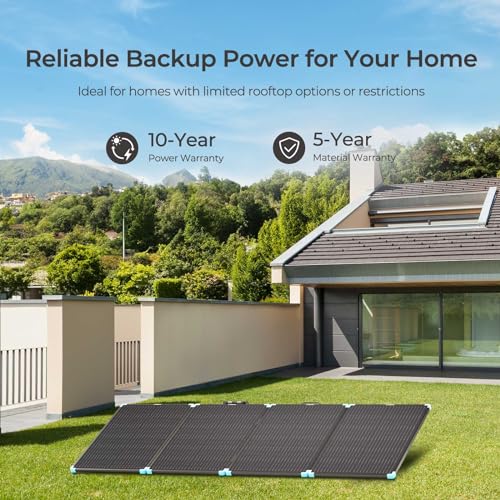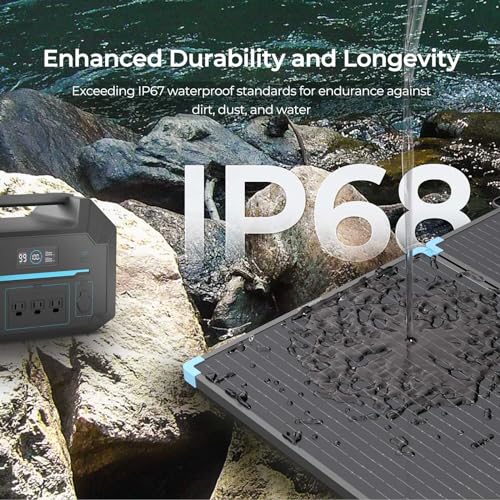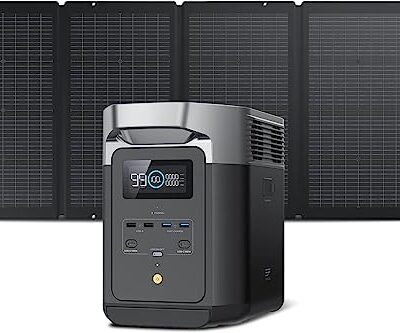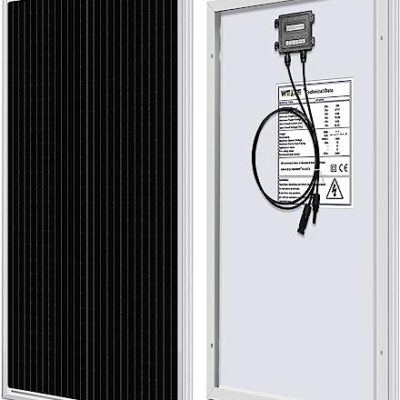Description
- Compact and Lightweight – Featuring a compact solar cell layout, this 220 watt solar suitcase weighs a mere 15.9lbs and boasts a more compact design than traditional 220W one-piece laminated assemblies, ensuring easy portability on the go.
- Premium Materials for Decades of Use – Reinforced with fiberglass material, Renogy 220W compact mono portable solar suitcase features EL-tested Grade A+ solar cells, delivering the highest power conversion efficiency and an extended lifespan.
- Fast Installation with Sturdy Kickstands – Featuring durable aluminum alloy construction, the robust foldable kickstands of this solar suitcase facilitate one-minute installation. With IP68 solar connectors, this compact 220W solar suitcase seamlessly connects to most portable power stations on the market.
- Environmental Endurance – Employing IP68 protection and ETFE coating, this all-weather suitcase excels in enduring snow, rain, and even light hail for decades. Enhanced with advanced materials including an aluminum backsheet, it ensures exceptional performance in any condition.
- 5-Year Warranty – Renogy 220W portable solar suitcase boasts a 5-year warranty for materials and workmanship, accompanied by a 10-year guarantee ensuring 80% output reliability.









Buck –
Only a brief test on a totally overcast day. Panel produced 22.5 volts and 85 watts on a dark gray day. I think it will preform great in full summer sun. I ordered this directly from Renogy. I expect Amazon will drop ship this item directly from Renogy warehouse in Ontario, California. In my case it did not ship in 2 or 3 days. After a week of no ship notice I contacted their customer service…(PITA) they found the order in the system, couldn’t explain why it hadn’t been placed in the shipping queue. From that point it took another 7 days before it actually shipped. Since I live on the east coast it spent another 7 days in transit. So 21 day delivery time. Nice product but if you’re planning to use this on a trip, Alow plenty of time for it to arrive….
Testing this suitcase in full sun at solar noon only produced 153 watts. So it may do 220w in the lab in controlled conditions but in the field it’s a 150w panel.
Compared it to 2 harbor freight 100 w panels which produced 198w.
Drawback is that they are way bulkier and heavy. Renoghy is light and compact but it is over rated.
Buck –
Real world experience:
I got 184w straight out of the gate, setting this up in the afternoon on a summer day in Seattle. After the panels warmed up in the sun, that dropped to between 170-175w for the next two hours while charging my Ecoflow Delta Mini. Had the same experience deployed while camping.
About other reviews stating it performed poorly:
Solar panels typically don’t hit their stated maximum wattage outside of a lab. This is because 1) Panels need to be properly aligned to the sun, and 2) Efficiency of all solar panels decreases as they heat up. You’re not going to see peak power output on hot days.
*Also depends on the charge controller and battery setup it’s connected to.
Why this panel?
I upgraded from a 100w Jackery, as it barely output enough to compensate for the draw from my fridge (~70w). I wanted to generate significantly more power without sacrificing much more room in the back of my car when camping. This suitcase fit the bill, as the form factor is only slightly larger and I’m getting >240% more power out of it. The 350w and 400w panels are all way too big for car camping.
Why not the 200w Renogy folding panel (ASIN B0CNPHD4VY)?
I opted to spend the extra ~$100 even though the output is nearly identical, because I wanted the warranty and durability that the rigid panels provide. There’s no fabric on these to fray or breakdown, it’s all metal and plastic, so I’m much more comfortable tossing it on gravel, dirt, grass, etc.
*The leads from the panel are only about two feet long, so you’ll need to source your own extension cables for your specific needs. I don’t consider this a complaint as it’s industry standard.